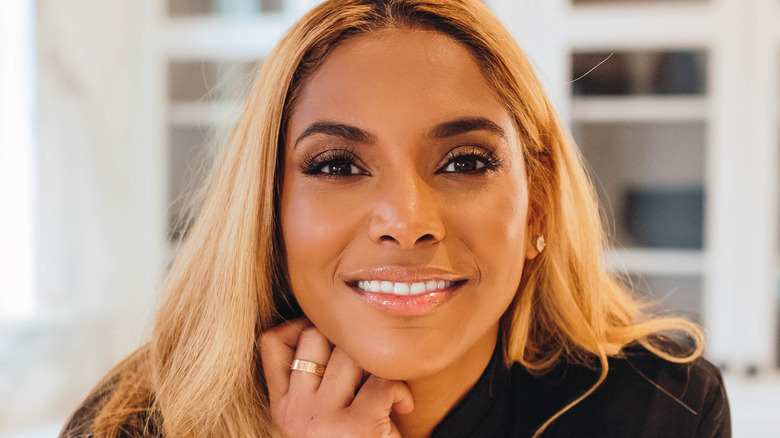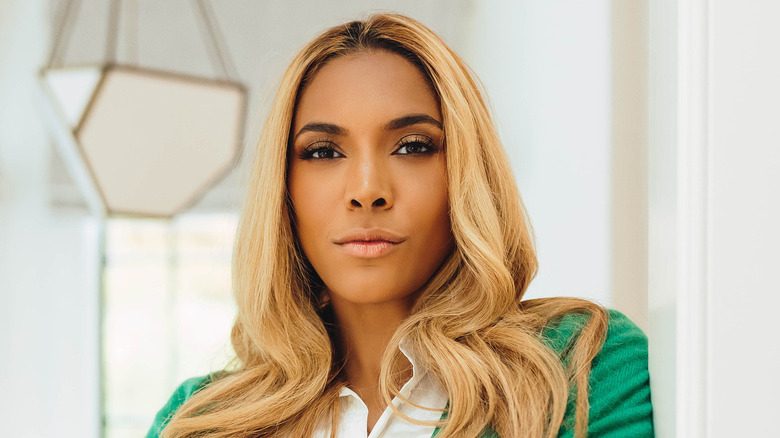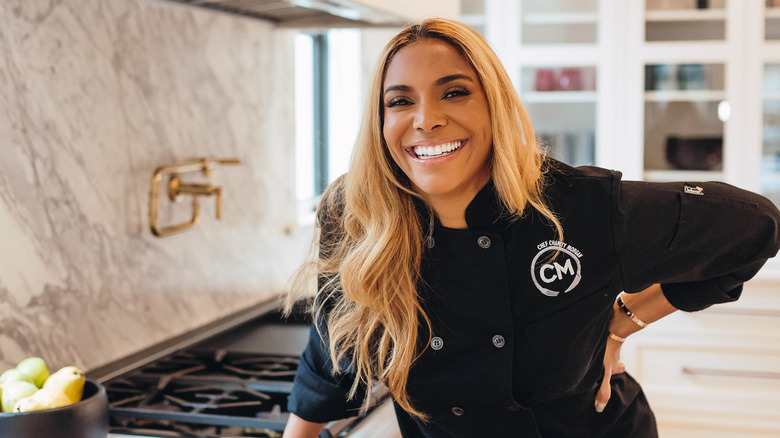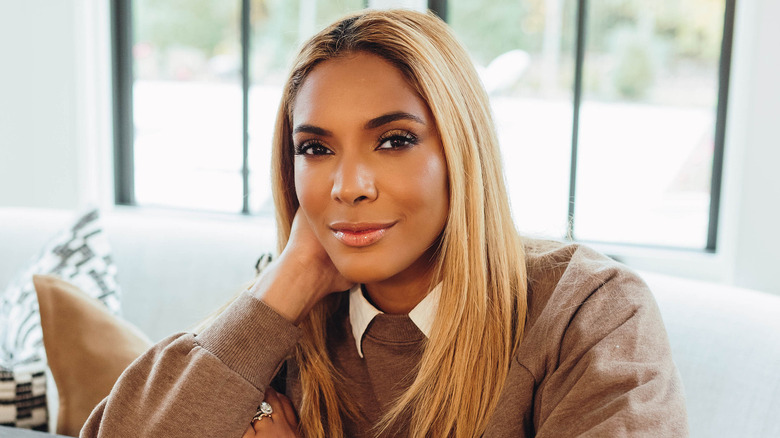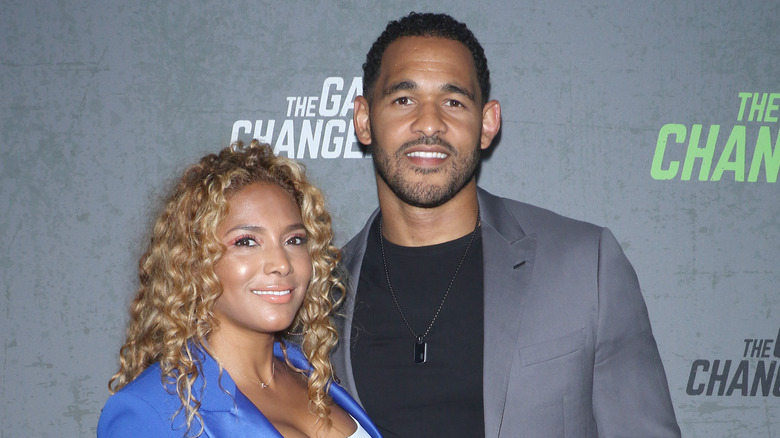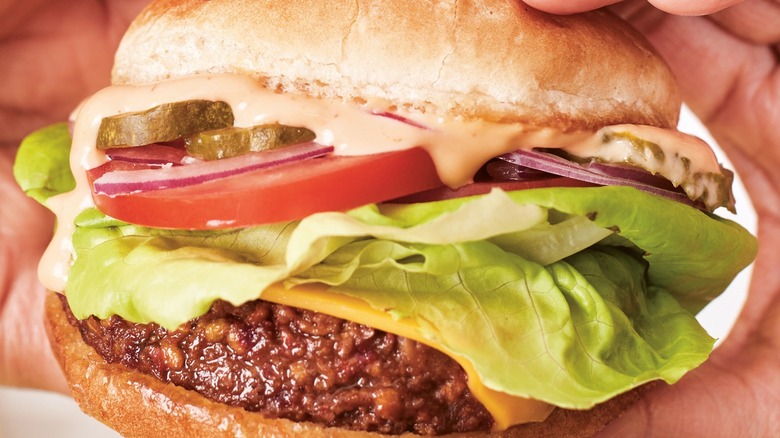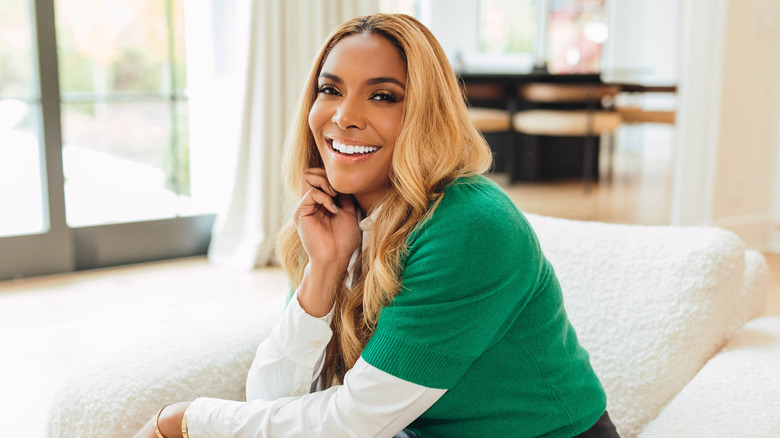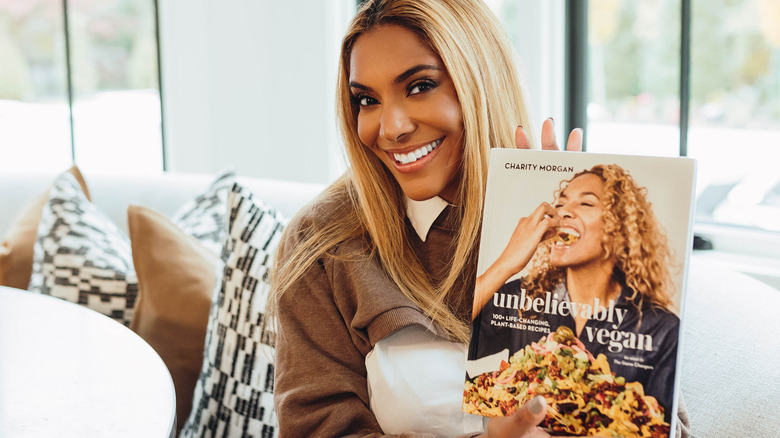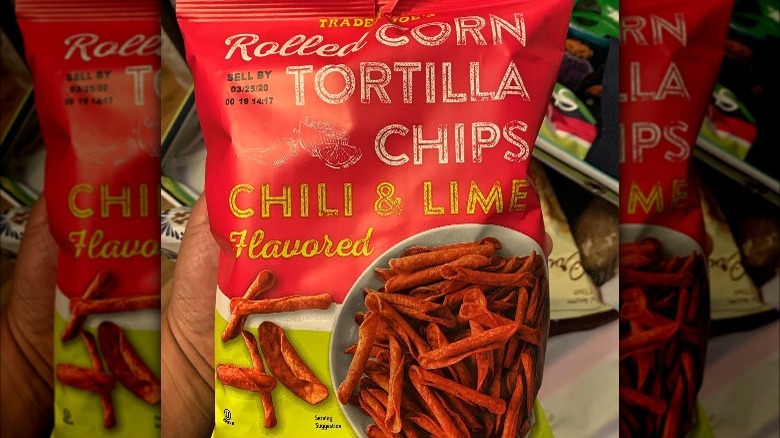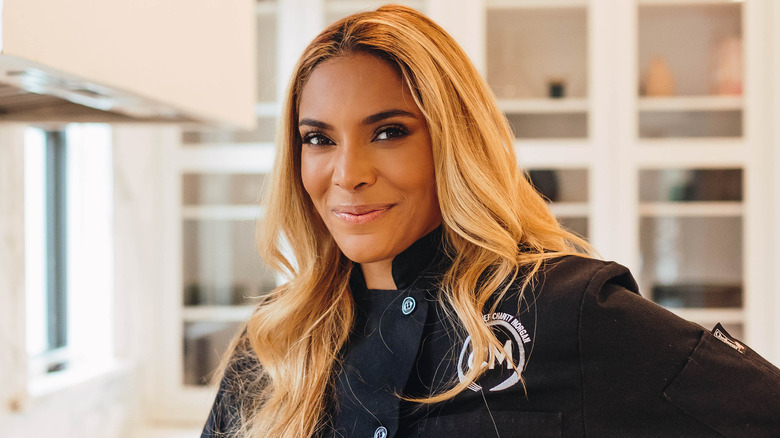Charity Morgan Compares Plegan And Vegan While Getting Cheesy With Treeline - Exclusive Interview
We may receive a commission on purchases made from links.
Charity Morgan didn't start out as a vegan, but in the past few years, she's singlehandedly changed 15 (at current count) of her husband's NFL teammates from meat-eaters to plant-based eaters. In an exclusive interview with Mashed, it became pretty clear to us how she did it. After graduating from Le Cordon Bleu, Morgan worked at several high-end restaurants in Los Angeles. After years of grunt work, she left the restaurant industry and opened her own private chef business, where she could exercise her bountiful creativity in preparing meals for clients who couldn't cook. Morgan comes from an eclectic family, and before meeting Tennessee Titans linebacker Derrick Morgan, her specialty was comfort food, laced with her Puerto Rican and Creole roots.
Derrick began noticing that his body wasn't processing food as an athlete needs, so he tried veganism. It was all pretty tasteless, however, and Charity turned her considerable skills to creating delicious vegan comfort food. The power couple were featured in the film "The Game Changers," and Morgan was sought out from people all over the world who wanted her recipes, which she's just published in her gorgeous cookbook, "Unbelievably Vegan." Recently, she's teamed up with Treeline Cheese and created three recipes in her cookbook with eight of their plant-based cheeses. With her infectious laugh, Morgan filled us in on her journey from California farm girl to celebrity "plegan" chef and first-time cookbook writer.
Charity Morgan's background is why she's a chef
Why don't we start with talking about your family history. You grew up in a farm. What kind of farm was it?
Outside of Sacramento, growing up was extremely rural and a lot of farmland, rice fields. I grew up right in the middle of rice fields. We ended up having our own cows, chickens, goats, and we actually had a horse. That was my childhood.
Did your family eat the animals you had on your farm?
Yes. When I first got horrified from eating beef, and it was the beginning of my journey, I saw my dad slaughter a cow. I have that memory of the cow on hooks upside down as you [drain] all the blood. It was collecting on sawdust. I still remember. I can literally smell it right now when I talk about it.
You grew up with a Puerto Rican mother and Creole grandma. Food was a big part of your family.
Yes, it was. My dad didn't cook, so my mom did all the cooking, but my dad loved food and it's the same thing as my husband. My husband loves food, [but] cannot make anything outside of a peanut of butter and jelly sandwich. My mom knew that the way to my dad's heart was food. She would always cook and experiment with food, and my mom being from Puerto Rico, I think that she always gravitated because first of all, back in the '80s, people didn't know [much about] Puerto Rico. People would see a Puerto Rican and consider [them] a Mexican. They didn't know the difference, and they didn't know it's a whole different part of the world and different upbringing and all that stuff. My mom always gravitated to other ethnic groups.
She had Filipino friends, Indian friends, Mexican friends. I remember growing up with her and her friends, always making these things. My mom would be in the kitchen making homemade tortillas with her Mexican friends, making lumpias with her Filipino friends and then making homemade curries and rotis with her Indian friends. Being versed in it was an understatement. We always were eating all these different kinds of foods. I think that played a lot to my culture and being and loving culture. I think that American's culture is s**t, out of everything. It's like, no, we really don't have a culture. We just steal from everyone else, but then when you really go into Vietnam and you look at all these beautiful dishes and herbs and spices, [and] in Korea, and that's kind of how I was raised, which is weird. I got that head start from my mother.
That led to your passion for cooking yourself?
100%, [along with] my dad being Creole and my mother making Creole dishes for him and always trying to gravitate towards his way of eating and having his mother teach her things. That's pretty much the foundation of where I started.
Charity Morgan got her start at Le Cordon Bleu
Do you remember at what age you started cooking?
Five. I started becoming the pest. I was the pest at five. I shadowed my mom, every single thing that she did. They called me my mom's shadow. I would irritate my mom. She couldn't get rid of me. She'd be like, "Stop following me! You're my shadow, give me some space!" She knew that I was very adamant about being around her, and I don't know what that stems from. Was I missed being the middle child, was I missing mommy time, or did I just really gravitate towards food? So she would always have these odd-end jobs that would keep me busy just so that I would stay out of her hair, whether it was grating massive, big blocks of cheese. I remember just grating blocks of cheese for so long because it was eight people in our family. I'm one of six kids. So it was like whatever we made, we always made a lot of and I shadowed, shadowed, shadowed. And by the age of eight, I was off to making my own meals.
Then you decided to go Le Cordon Bleu?
Yes, I did the Pasadena program, and I'm so sad that it's not even there anymore. This is a recent thing. I literally looked it up and was like, what? No way, and super sad. It was something about funding, which was hard for me to believe. I think it was bad money management because those courses and that school [were] a s*** ton of money. It was so expensive to go there, and it was always doing things to raise money.
It was a very tough program. I always tell people, "There's no shortcuts to the things that you want to do in life." I remember wanting to quit several times. I remember, my second week in, after the excitement rubbed off. I'm like, "Whoa, this thing is hard." You're leaving your first couple weeks with tons of cuts up your fingers and on your arms and burns ... that's why it was a [mostly] man's industry because I think that they purposely try to push women out because it's so tough.
I think it was only like four or five girls in our class. It was like a class of [about] 40 people. It was so many guys ... but I think that women are showing up and showing out because we have so much passion. Women have passion and they have a different way of doing things. It's not that it's better or one person's way, but we all know that having a woman's perspective in a certain environment can definitely change the attitude of things.
Charity Morgan left the restaurant industry to go out on her own
After Cordon Bleu, did you start to work at restaurants?
That's actually a requirement. You have to do an externship. I did an externship at Lucques. It's no longer there. It was a very high-end restaurant off Melrose, and then I did some work. It was a restaurant off Santa Monica Boulevard called Lemon Moon. I worked there and it was probably the second or third restaurant. Then I actually worked for some catering companies. I believe it was a catering company [that] did all of the movie sets and parties and engagements and events. It wasn't long after that — I didn't do that very long at all — when I realized that's not what I really wanted to do. Most people don't realize when you are in culinary school, and you're like, "I want to own my own restaurant," or "I want to work in a restaurant," you're predominantly making the same thing every single day. It's not your creation. It's someone else's, and you start off very low, as a prep chef, and you have to work your way up, and it's so much work.
I'm not saying that it's impossible, but it was a different way [from] how I envisioned food and how I envisioned food for me. As a creative person, I'm creative in many things. I love art. I love drawing. I love painting. I love home design because my dad built homes. I actually like doing full designs, like tearing out walls and that kind of design, not interior designs. I'm talking about what kind of windows to put in. My kind of creativity runs really deep in me.
I realized what I really love and enjoy about food is creating something new, using ingredients that [I've] never used or rarely use and exploring with them and not knowing what [I'm] going to make for dinner ... it's like the chef way of doing things, like "What's the daily special?" Probably something that you have, or your purveyor had too much of. That's how I cook today where I'm like, "Oh my gosh, how did I end up with three butternut squashes?" Okay, well we're going to make something with butternut squash today. That's the way that I really like to cook, and I knew that I wouldn't be able to live in that world, working in restaurants and the constraints of it.
Did you then start your own company then, at that point?
I was a worker bee, and I thrive under creative juices. I wasn't plant-based at the time, but it was a personal catering meal prep service because in LA, people don't realize that a lot of people love to eat at home. They think that people love to just eat at restaurants. No.
Everybody loves home-cooked meals, but what do they have at their fingertips? Most people don't know how to cook. They don't have time to cook, too busy, or they want to lose weight, or they have a specific diet. I felt like that's where I came in, where you see that there's a need, and you have a solution. That's what I did. I started off that way of doing meal prepping and cooking for clients. Sometimes it was as simple as a husband or a boyfriend would call me and say, "Hey, I need you to help my wife learn how to cook." I would go into people's kitchens and teach them how to cook.
This is why Charity Morgan went vegan
How did you meet Derrick?
A friend played Cupid, and I never was into the hookup thing, and this one actually worked. That's the long story short. We did the long-distance thing for a long time, and then finally we decided to move things up. I was living in LA, and he was between Atlanta and Nashville at the time.
He decided that he needed to feel better? Or what propelled him to veganism?
[With] athletes or an athlete in your life, whether they're marathon runners or triathletes, the more elite you get with an athlete, the more they're pouring into the body. It was always something different every year. Derrick had all these different modalities, like hyperbaric chambers and different therapies.
In 2017, he was like, "I'm going to look into nutrition" because he just felt like, no matter how hard he worked and no matter what he did, he never could shred up and cut up like he wanted. He hired a nutritionist [in LA, and she] was the first person to say, "Hey, have you ever thought of going plant-based?" She was the one to implant that idea that it can happen for all the right reasons and all the objectives and goals that you have.
[Derrick] went plant-based off season. It was late February, early March. He went through the entire spring and all season eating this way. I jumped on maybe a month or two after he was already plant-based, and he hated the food he was eating. He had a meal-prep service [where] they drop it off for the entire week at his doorstep. It was flavorless, but again, the mind of an athlete, they are very sacrificial with their bodies and things. They'll do certain things that other people won't do if it gets them to where they want to be. He was miserable eating, and ... at that time I was having digestive issues, and I felt so unhealthy. That's why I went plant-based.
...I talk about this more in the book, that we did try to go plant-based in 2015, and we failed and it lasted only two weeks. That's what I use, all those experiences and all those failures to teach people what not to do and how to conquer this the right way.
Charity Morgan changed how the Titans eat
How did you get the NFL players to start eating plant-based?
[Derrick]'s about to start going back to training camp [at the time]. I know that the Titans are not going to make him things that he wants or needs for his body, so let me help him out. I sent him on his merry way, packing his lunches, and I went and bought all the meal prep things. It was professionally packed, and it looked like he was getting a meal-prep service, but it was his wife doing it. When he came into the facility for lunchtime, everybody was more inquisitive ... what [he is] eating is so different from all the other 50, 60 guys, plus the staff, they all ate the same thing. Here comes Derrick with his meals that were so different, and it was a conversation starter, and he talked to them about out why he did it.
By day two, they saw those meals. I remember that meal that I sent in that day. Black beans, sweet potato with bell pepper, onion, garlic, and all these spices, and cilantro. It was enchiladas, and I made my own homemade enchilada sauce. It was cheesy. He had rice, he had beans, he had a side salad and they're like, "Whoa, that looks so good. Do you think that she'll ... Would your wife want to make me a meal?" At that time, it was four guys that signed up on the very first day, [and] I got the text right after lunch. I'm like, "Well, I don't mind." He was like, "Do you mind? Number 99," and he starts giving me all their numbers of everybody that wanted to try it. As a chef, people don't understand, it's so much easier to cook for four people than it is to cook for one.
At the time, I weighed out the pros and because it is easier to cook for five guys rather than just cook one single meal. I can do it that way. It just kept growing from there, and then, as you know, once you start buying in bulk, things get cheaper, and it just got easier. That's how it officially started. Week two, I was cooking for about 10 to 12 guys. I realized at that moment that I actually had a business. It wasn't just "I'm doing something nice."
Charity Morgan explains what 'plegan' means
You've coined the word "plegan." Does it stem from the team wears leather but are eating vegan?
It wasn't just that. It was more of a frustration that I [reached]. That was actually a quote from the book, and it happened because when I first went plant-based, and I had my athletes going plant-based, and we first started getting the recognition and the articles coming out from ESPN, I got these horrible messages from people on Instagram, Twitter, [and] through my website of, "How dare you not talk about animal welfare? And the athletes are wearing leather shoes. And how can you guys call yourself vegan when you guys are playing with a leather football?" It was so absurd, it pissed me off. I'm already a rebel at heart, so it was kind of like, "You guys, I'm taking my ball, and I'm playing elsewhere."
I'm going to go create my own ball. I'm playing elsewhere with my concept because I felt like I didn't fit. Yes, I used [plegan and vegan] interchangeably because the food, ultimately, is vegan. There's no animal product whatsoever in my food, but then you have the plant-based side that's like, "Oh, you shouldn't be using oil and you shouldn't use this, and it should be all whole foods." Sometimes, people want to cut a corner, and they want to use an organic canned butter bean ... to speed things up. I make everything from scratch because that's my life, but I can't expect that everybody has the same kind of time [or that] they're a chef like me. I felt like I didn't fit in either box, and it was a little bit of the two.
That's why I came up with plegan, and because I wanted a place where people grow with their food knowledge, where I'm meeting you, and it's not a one size fits all, "How vegan are you?" or "You're not vegan enough" because I, being vegan, was in that category. I felt so scrutinized. It almost made me want to quit. It kept me pushing more because I realized that my athletes needed me. It wasn't about me. By that time, it was bigger than me. I realized that more people needed a voice like mine, instead of feeling always defensive of "Hold on, I don't want you to judge me because of what I eat. I eat this way because this is how my grandmother cooked for me or my mom cooked like this." I feel like I don't have that authority over you to tell an adult how to eat. I'm here to inspire you, empower you to eat more plant-based.
How Charity Morgan wrote her first cookbook
What you prepared in "The Game Changers" was amazing.
Everything I did is all in the book. That's why I created those recipes, and that's where the book actually came from. I always record recipes that I really loved so I can create them again. I already had a compilation of recipes that I could at least kick off the book with. And then when people were sending me messages all over the world, I got messages from Russia, from Germany, from Mexico, from Brazil, Canada, all over the world. "Please say you have a cookbook. What were those burgers that you made? Oh my gosh, that macaroni and cheese."
It was every single day. "Please tell me your Caesar salad is somewhere on your website." That's when I realized I needed a cookbook. I needed my cornerstone of my brand, and I started working on my cookbook. Everyone asks, "Are the recipes from 'The Game Changers' there? And I'm like, "Yep. Every single one of them."
Do you have Creole or Puerto Rican versions of vegan in your cookbook?
Yes. I'm so glad you asked that because a lot of what you see in the cookbook is the things that you saw in "The Game Changers," but it's everything that my athletes like. One of my clients is Miley Cyrus. She was vegan for a long time, and she wanted chicken and dumplings. I created the chicken and dumplings for her that she loves so much, that she ended up calling me like two, three months before her wedding and was like, "You're cooking for my wedding and you're making chicken and dumplings, and you're making your Caesar salad, you're making fried chicken. I'm going to put together a menu, and you're cooking for my wedding." I was like, "Okay!" You'll see all of my clients' favorites in there. You get my background. I make my grandmother's because my dad's side being Creole, my last name was Duplechan, which was the French side of me.
And you have my grandma Duplechan's gumbo in there and her jambalaya, and you have [a] Puerto Rican dish, like pastelillo, which are like Puerto Rican empanadas. You have all these beautiful dishes like arroz con gandules, which is like a Puerto Rican party rice ... It's as if you are in the world of Charity Morgan when you get this book, because I do these fusions where it's like, I love Caesar salad, but I love my Creole background, so guess what? We're going to make a Creole Cajun-style Caesar salad, and I do it with cornbread croutons and like this super flavorful Caesar dressing that has Creole spices in it.
I make a sour cream out of Brazil nuts, and it's so easy to make ... they're high in selenium and good for you ... I have London pub-style fish and chips in the book. I have lobster bisque. It's a truth snippet of who I am, what I like to eat, and my whole entire background.
This is Charity Morgan's favorite junk food
Is there any junk food that you would admit to liking?
Oh yes. [It's] super weird, but there are these chili-lime rolled tortilla chips at Trader Joe's. It's like my crack. I cannot live without them. I love them. I buy seven bags at a time. I'm not a [sweets] person. I like spicy, salty, or vinegar things, and those chips hit every single one of those notes that I need.
What's the one ingredient you couldn't live without?
Oh gosh, this is so hard. Lentils. I love lentils.
Which chef would you love to cook a meal for you?
Thomas Keller. He brings this very simple essence of food into your kitchens. And when I was like on a huge kick of just any cookbook that he came out with, I was going to own it and the simplicity of his meals, and I would love to see what he does with vegetables only.
Charity Morgan has partnered with Treeline Cheese
Talk a little bit about your partnership with Treeline Cheese.
They reached out to me wanting to do something around the book because they know that I was using things that needed cream cheese. I definitely decided that, yeah, this is a good opportunity to just let people know that you have to make a...because I do have a cream cheese recipe in the book. You don't have to make a cream cheese recipe from scratch. Cheat. Go to the store and buy a plant-based cream cheese ... they're getting better and better every year. I love Treeline Cheeses. I've put them on charcuterie platters and boards, and my meat eaters love these cheeses because this tastes like real cheese. That was a really big hit when I did a charcuterie board, so I decided to partner with them.
Is there anything else you want to add?
I'm a first time author, [so] buy the book, leave a review. It's so funny because I'm in a world competing against bloggers and ... you're a chef [first], but you write a book, and you still have to... It's always about proving to people who you are. I want people to definitely read my work.
Charity Morgan's debut cookbook — "Unbelievably Vegan: 100+ Life-Changing, Plant-Based Recipes" — can be purchased on Amazon. Treeline Cheese is offering a promotional package of "Unbelievably Vegan" and eight plant-based cheeses on their website.
